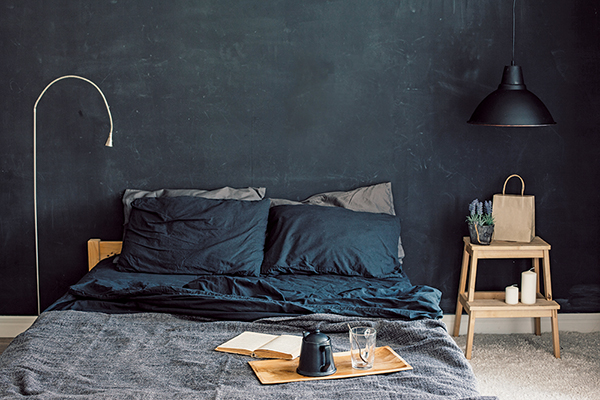According to a recent study conducted by SleepScore Labs, 68% of Americans are sleeping less than the recommended seven hours per night for optimal health. We are stressed out, we work too much and the past year and a half of coping with a novel virus pandemic is not helping.
If you’ve been struggling to fall asleep or stay asleep, there are a few material changes you can make to improve your sleep, none of which are “take the TV out of your room” because surely that’s been done by now, right?

Cuddledown linen sheets range from $198 for twin flat + fitted to $428 for king flat + fitted; L.L. Bean cotton percale sheet sets range from $99 for twin to $159 for king, shown here in the Nautical Map print.
BEDDING. If you sleep hot, the material of your sheets can help mitigate discomfort. Cotton percale is a common choice. The tight weave creates a matte finish that feels crisp and cool. Linen sheets have a loose weave, allowing more air to flow through. Linen has a unique feel and can be pricey, so before you purchase, check the vendor’s return policy. If you sweat when you sleep, you might want a synthetic blend. Popular materials are bamboo/rayon or Tencel, which is made from eucalyptus pulp.
MATTRESS. Memory foam and latex are popular for side sleepers and sensitive joints, but a mattress made exclusively of these materials will retain heat. Portland Mattress Makers’ top-of-the-line Boothbay Combo ($1,600 to $2,640 at portlandmattressmakers.com) combines these materials with pocket coils to keep air moving. It comes with four different cushion layers and the staff can help you pick what’s best. Plus, every-thing they make is as affordable as a mattress you can buy online.
LIGHTING. While overhead lighting kills the mood, stylish table lamps can set it. Consider an adjustable desk lamp to get direct reading light without any extra room illumination. You could save nightstand space with a wall lamp, which is DIY install if you do thorough research before cutting into the plaster. Find unique, vintage lighting to match your style at Flea for All in Portland, Cabot Mill Antiques in Brunswick, Wiscasset Antiques Mall, Maine Antiques and Salvage in Fairfield or Hallowell Antique Mall.

Consider an adjustable lamp to get direct reading light without any extra room illumination. Shutterstock
SHADES AND CURTAINS. Every experienced insomniac has black-out shades or curtains. You can get cord-less blackout shades cut to almost any size at Home Depot (starting at $37.97). Light-blocking curtains are specifically rated as “blackout” and can be purchased from many home retailers. Bonus feature of heavy-duty curtains: they can provide extra insulation in your bedroom this winter. For an impermanent installation, try an Umbra Blackout Magnetic Window Cover ($44.99 at acehardware.com), which tapes on and includes sewn-in magnets to fold the shade up and down from an anchor.
SLEEPING ACCESSORIES. Like your TV, a smartphone should not be in your bedroom. Remember desk clocks? Find something stylish that won’t tempt you to check anything but the time when you look at it. Find a spot in the house to listen to a guided meditation from the apps Calm or Headspace (both $69.99/year) and leave your phone there before heading to bed.
Replace an app with a white noise machine to block errant sounds or simply soothe yourself. Yogasleep’s Dohm Classic ($44.95 at yogasleep.com) is popular because it uses a real fan, not a recording, to create sound. It comes in six colors, including pink and camouflage.
Your sense of smell is more powerful than you know. Essential oils in a diffuser will relax you while adding moisture to the air. Lavender is a go-to calming scent, but cedarwood is another tried and true natural sedative. The New York Times Wirecutter recommends the Urpower 300ml Aroma Essential Oil Diffuser ($24.99 at urpower.net).
Comments are not available on this story.
Send questions/comments to the editors.


